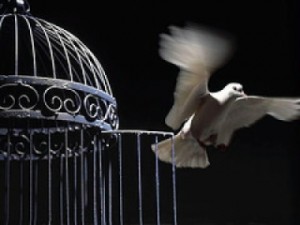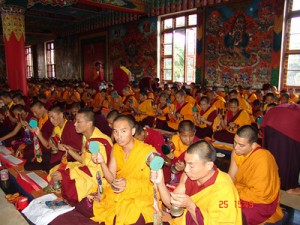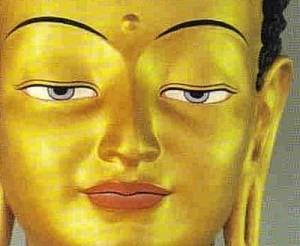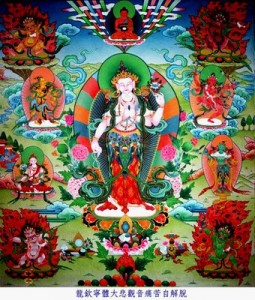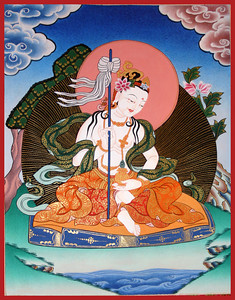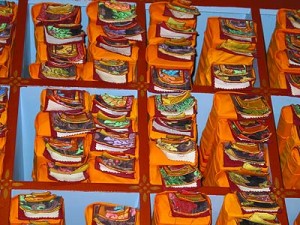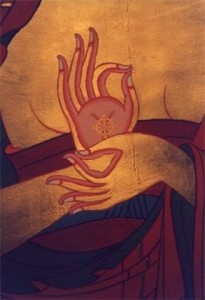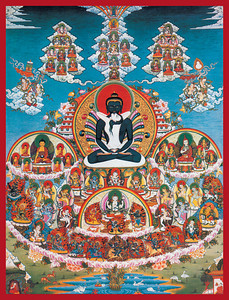
In this excerpt from a teaching called Bodhicitta, Jetsunma speaks to her students about her recognition by His Holiness Penor Rinpoche.
The person who is practicing needs to be able to distinguish between a diamond and a rhinestone. You have to know the miraculous really exists and you have to have faith in it. Sentient beings are helpless if they’re lost in cyclic existence; they can’t make any breakthroughs. They can’t really break out by themselves. Somehow they have to receive a direct mind empowerment from someone that has made certain progress. One way that you can do that in the Vajrayana system is to take wangs and another way that you can do that is to have a kind of mind-to-mind relationship with your teacher. There is a transmission that goes on, but you have to have faith for that to happen.
His Holiness said, “I could sit there and hit you with the bumpa all day long until you are flat on your head. If you don’t have faith in the teacher, you don’t have faith in the wang, if you don’t know what’s happening, you can’t work with the wang. Your head could be flat, but nothing is going to happen.” He said you have to have to faith.
Realizing that, he and I began to talk about that, and after a while it became necessary for the recognition [editor’s note: Refers to Jetsunma’s recognition]. What does the recognition mean? I don’t know. It means nothing has changed. What’s changed? Michael, my husband, said he had an interesting kind of perception. He’s married. All of a sudden he’s married to a tulku. And I said, “All of a sudden you are married to a tulku? What were you married to before, a bran muffin? Dear friend, you were always married to a tulku.” And he said, “I think about how we used to be together before,” and I said, “We’re still doing it. I get better that now you know it?” I don’t mean to be crass. But you have to understand what is going on here. In one way, nothing has changed. The event, the real thing between us hasn’t changed. If I was your friend before, I’m your friend now, you see? If I was your teacher before, I’m your teacher now. If I was the biggest pain in the neck in your life, I’m still that now. That hasn’t changed. But now you have taken off the blinders.
What the recognition means is that you have a handle or a way to take off your blinders and to have real faith. That’s what has got to happen. This path doesn’t work without faith. It’s awful that I have to teach this to you. Somebody else should teach this to you, like a Khenpo. But this is Kaliyuga and this is the West and we’re in it together so you are just going to have to put up with it.
You have to realize that all this time the miraculous has been right in front of you and it’s part of your life. You weren’t able to realize before what an opportunity you had, but now you can realize that. It doesn’t mean that now there is a big change in your life because your teacher has been recognized as a tulku. You might think, “That means now I have to drop everything and do three prostrations first time I see her.” Well, OK, that’s what they do. That’s customary. That’s good Guru Yoga. But it’s not about what you do with your arms and legs. It’s good that you practice that because it helps you to remember. It’s not that, “Now I have to give her a cup that’s covered all the time.” These are the stupid things that people are fearful about – forgetting to give me the right kind of cup. You think that’s what it is all about. Or you think, “What if I walk into the room first and she walks behind me and I didn’t see her?” Do you know how many times that’s happened me? In India, I didn’t even know which ones were the tulkus and which ones weren’t, because I hadn’t learned them all yet. You don’t always look where you are going. I didn’t care. I was just right in there.
You make mistakes like that. That’s not what it’s all about. You shouldn’t be fearful like that. You shouldn’t be. The relationship hasn’t changed in that way. The love is still there. Everything is still the same. Now you get to realize that the miraculous activity of Guru Rinpoche is happening in your life, that you have this precious opportunity and that this is a really good time to take advantage of it.
You have the opportunity. To paraphrase, Guru Rinpoche said, “Maybe you won’t see my body, but I will come as your teachers.” When Guru Rinpoche says something like that, I believe it out of hand. When I see my teachers, I know that Guru Rinpoche is with me. That same miraculous activity is right with you. The stuff that saves is right there. What has changed is that now you have to realize and you have to practice Guru Yoga with such faith. That’s what your job is. All the great teachers have said it is so, therefore I believe it. Not only that, but I’ve seen it. That’s what it means. I haven’t changed from a caterpillar to a butterfly. I’m exactly the same as I was before. Have you noticed that?
What has changed is that you have now a way to take some blinders off and you can realize for the first time that who you thought was your best friend, is still your best friend, but in a different way. You thought you had to cling to some kind of humanity – a best friend, a sister, and comrade, somebody you could go drinking with. That’s what you thought you had to have. But that was only temporary. It was a masquerade. You still have your best friend. But now you find out your best friend is the Three Precious Jewels and it’s always been that way, except that you didn’t know it before. Now you know it. So the only thing that has changed is you. You get to take your blinders off.
You get to see that in your life right now is spontaneous, miraculous activity and that this is your time, this is your time and you can do it. Nothing’s changed except now you get to practice properly. What’s there in front of you has always been there in front of you. I didn’t become a tulku a month ago. That’s the stupidest thing you ever heard of it, isn’t it?
Try to practice Guru Yoga properly. Realize that right now, miraculous activity is in your life. The reality of non-dual mind is in your life, and it’s your best friend. It’s right in front of you. The whole visualization of Kuntuzangpo and Kuntuzangmo and what it means, it’s not just a visualization. It’s the truth. It’s really there. You have this. We have His Holiness and we have Gyatrul Rinpoche, and you have your root teacher. That means it’s for real. It’s the truth. It’s right there with you.
Sometimes I look at His Holiness and I think, “My gosh, what do I need with a visualization. I’ve got you.” It’s there, it’s right in front of me. It’s nothing that I made up. And it’s the same for you. Now you know it. That’s the only difference. Don’t be scared. You try to get it right; sure you should try to get it right. I try to get it right. But just try to realize that right now you have every reason and cause and expectation to deepen properly. You have everything you need if you just do it. What are you so distracted about? Just do what you have to do and do it now before it’s too late.
They say a door can’t chase people around the room, but I swear, I remember chasing a lot of people around the room. This may be the time you get that opportunity, so you better walk through the door really soon into deeper practice.
Copyright © Jetsunma Ahkon Lhamo. All rights reserved
